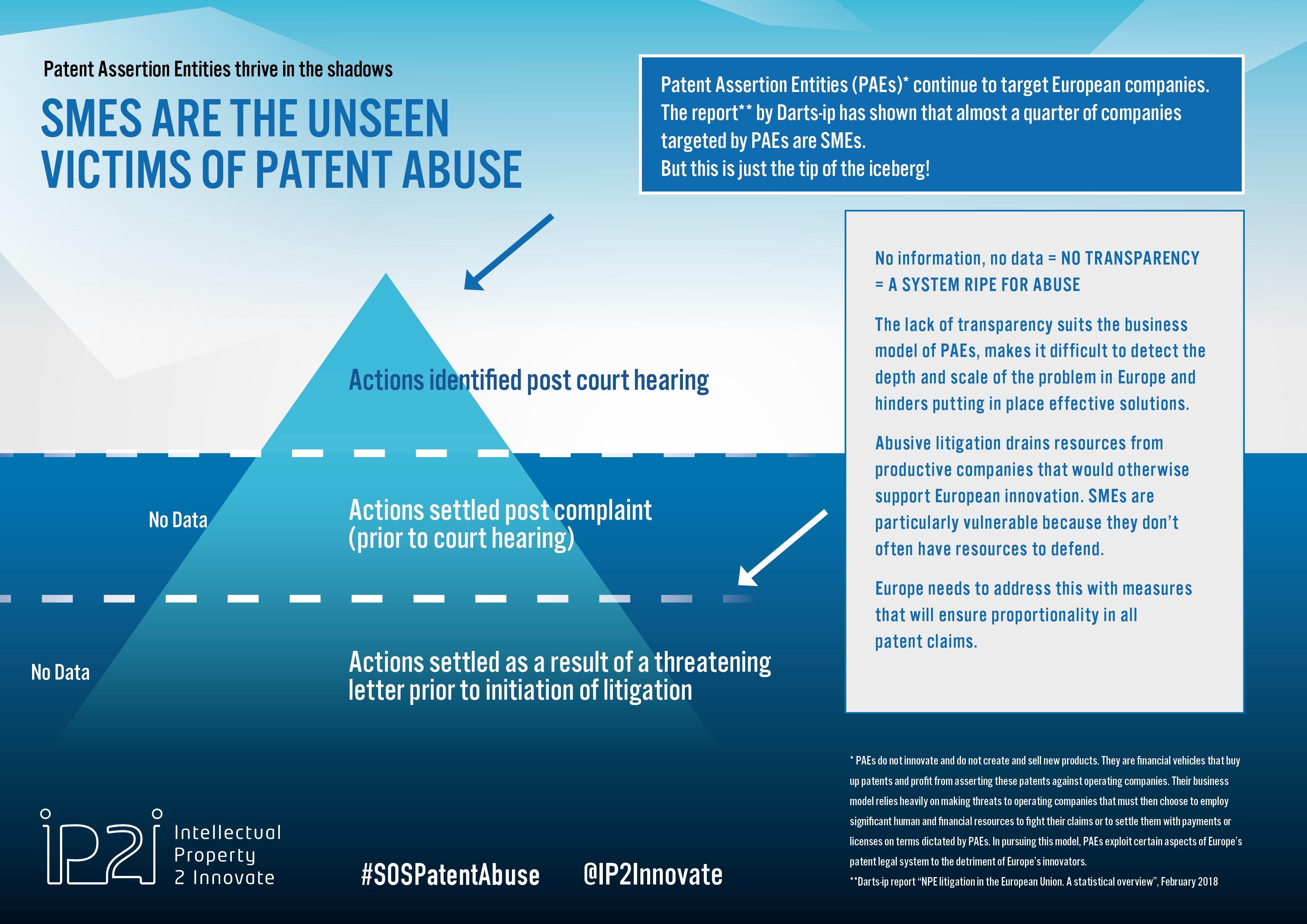Patent abuse hurts European SMEs and undermines the knowledge transfer process

This year World Intellectual Property Day focuses on SMEs. As the two examples below show, patents can be an SME’s worst enemy, as well as their best friend. Abuse by patent assertion entities is a serious and growing threat in Europe, especially to small and mid-size innovative firms. The gaming of the European patent system must stop.
Patents ought to be an SME’s best friend. They help attract finance and provide a route to commercial success, right? True, but that’s not the whole story. Increasingly SMEs are finding themselves at the wrong end of baseless patent litigation. Instead of sparking innovation the misuse of patents deters it.
Just like big corporations, SMEs find themselves the target of patent assertion entities (PAEs), also known as patent trolls. These organizations are in business solely to make money from patents they have acquired. They don’t invent things; nor do they produce anything. They often hide their true identity behind opaque networks of shell companies, often set up expressly to exploit just a single patent.
Their targets are faced with a stark choice: either engage in years of costly and time-consuming litigation or pay huge sums to settle.
Few victims speak out about their experience. The ones that go to court do at least leave a paper trail for public record.
But for those that settle out of court there is no record of their experience at the hands of PAEs. While it is impossible to say precisely how many firms settle, it is clear that the cases that get to court are just the tip of the iceberg.

Here are two examples of SMEs that have been attacked by PAEs. The first went to court, the second settled.
The first is AVM, a mid-size German consumer electronics and IT network firm. It battled with a Panama-based PAE called Dragon Green Development Balboa for over a decade.
It won on final appeal but was left having to pay legal and court fees because Dragon Green used a British shell company with no assets apart from its patents to launch the attack. Shortly after the final appeal ruling the shell company was liquidated.
The second and more dramatic example is NTR Global, a small Anglo-Spanish firm building remote access software for IT support services. The firm abandoned an attempted legal defence against the PAE and settled before the case went before a judge.
The person telling the story about NTR Global was a director at the time of the attack just over a decade ago. He insists on remaining anonymous because he doesn’t want to attract more attention from patent assertion entities like the one that turned his life upside down. And because it’s not an episode he is particularly proud of.
“Trolls sharpen their knives on small firms they know can’t afford a legal fight. Then they take on the big guns. It’s a common pattern, and it’s what happened to us,” the former director said.
His firm was sued for alleged breach of a patent in its remote access software products. The litigant – an unnamed patent assertion entity (PAE) – later went after larger competitors in the same market.
NTR Global briefly teamed up with its competitors to form a group defense to fight the patent troll. However, the astronomic costs of seeking outside legal counsel, combined with the inevitable internal disruption sparked by the attack persuaded NTR to cave in and settle.
It paid the PAE a seven figure sum, crippling the company financially. Within two years it sold out to a larger US rival called ASG Technologies.
“There’s no doubt that the patent attack was a turning point for the firm,” the former NTR executive said.
Last June ASG discontinued NTR’s products altogether. A sad end to an innovative, European SME.
IP2Innovate wants to hear from other European SMEs that have been targeted by patent trolls. So do our friends at the association representing European SME’s, European Entrepreneurs CEA-PME.
“If Europe’s patent system is to function properly then it must address the problem of patent trolls,” said Stefan Moritz, Managing Director of European Entrepreneurs CEA-PME, the largest federation of voluntarily associated SMEs in Europe.
“SMEs are the powerhouse of Europe’s economy. If they have to fight off baseless patent attacks then that’s bad for the whole economy, not just the individual firms. Opportunistic attacks like these undermine the whole knowledge transfer process and it’s in Europe’s interest to ensure the EU law is applied and SMEs are defended,” Mr. Moritz said.
IP2Innovate has been campaigning for reforms in Europe’s patent system for many years. It is pushing for better application of existing EU law, which calls for proportionality in all patent claims. This principle is being ignored in patent courts across the EU.
As a result, there is a strong financial incentive to launch frivolous patent claims against firms of all sizes. Gaming the patent system is very profitable, as in the case of NTR Global. Also, the risk is limited, as in the case of AVM.
For more about the AVM case read an academic study published last summer by professor Sterzi and colleagues from the University of Bordeaux, or a summary article published in World Intellectual Property Review.
IP2Innovate mentioned the experiences of NTR Global in an article in Euractiv last year, but at the time the firm’s products were still available in the market, so we couldn’t mention the firm by name.
Other blogs

UPC Early Litigation Data: The Innovation Paradox

Seeking a new balance point in Europe’s patent system that better suits innovation and society

